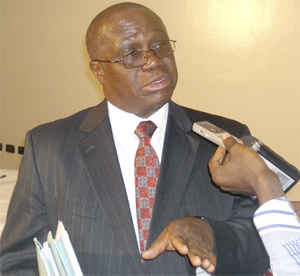The Governor of the Bank of Ghana, Dr. Henry Kofi Wampah, has said that the central bank is working to get all the electronic payment systems in the country to converge on a single platform, the e-zwich, in a bid to meet banking consumers’ needs more effectively and at lower cost.
The governor of the central bank did not give a set date for the converged system to be achieved, but it is widely expected that the initiative will be achieved within the next two years.
“The central bank is looking toward the convergence of all electronic payments, and we very much appreciate of this bold initiative that, eventually, all the banks will migrate and join,” he said.
Dr. Wampah said this in a speech read on his behalf by Clarissa Kudowor, Chief Manager, National Payment Systems Oversight Office of the Bank of Ghana, at the launch of a partnership deal between eTranzact and Vodafone Ghana to allow the telecom operators’ customers the option of making instant bill payments, in Accra yesterday.
He said an efficient payment system has the potential to promote financial inclusiveness and help the central bank cut down on the cost of printing and managing currency in the country.
“Indeed, one of the key central bank objectives has been the need to promote and encourage ‘Cashlite’ in the medium-term, and in the long-term, Cashless.
“As a middle-income economy, it is important that the country migrates from the heavy reliance on cash and paper payment instruments to an electronic mode of payments -- which apart from speed, safety and efficiency also encourages high transaction volumes, greater transparency, less corruption and faster rate of economic growth.
“Making this shift to an electronic payment system is a major social and developmental change. As we begin to shift people away from the predominant use of cash in their daily transactions to the electronic payment, we will certainly achieve the mopping-up of excess cash outside the banking system.
“This will enable government’s policies to better influence savings and investment behaviour within the country. From the perspective of the central bank, the huge expense involved in printing money, its distribution, providing security and protecting the currency, can be significantly reduced,” he said.
The central bank has since April 2008 introduced the national switch, e-zwich, to about 500,000 people in an attempt to bring banking services closer to the populace and also promotes electronic payment transactions.
As a smart-card payment system, the e-zwich is managed by the central bank-owned Ghana Interbank Payment and Settlement System as an innovative method for improving accessibility to banking and retail services in Ghana.
The e-zwich system offers deposit-taking financial institutions a platform that enables them to interoperate. This enables e-zwich cardholders to perform banking and retail transactions at the outlets of other e-zwich financial institutions, and e-zwich point of sales terminals.
Already, some banks have begun processes to integrate their switches and Automated Teller Machines (ATMs) to the national switch.
Earlier this week, the central bank directed all banks in the country issue e-zwich cards to all their customers -- and offer e-zwich services and point of sale terminals across all their branches by the end of this month in order to boost penetration of the e-zwich for electronic transactions.
Business News of Saturday, 14 June 2014
Source: B&FT
BoG targets converged payment system
Entertainment












